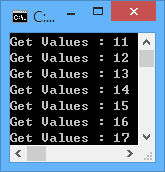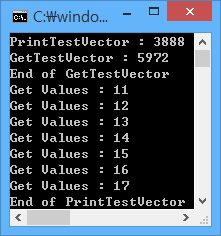그동안 Multi-thread Programming에서 가장 어려운 부분은 thread 간의 통신 방법이다.
Modern C++에서는 Task (thread, async) 간의 통신 방법에 대해서도 제공을 해 주었다.
사용법은 간단하다. 아래와 같은 3단계로 이루어져 있다.
1. promise<T>와 future<T>를 연결
2. promise<T>에 .set_value()
3. future<T>에서 .get()
| #include <iostream>
#include <thread>
#include <future>
#include <utility>
using std::cout;
using std::endl;
using std::vector;
using std::promise;
using std::future;
using std::thread;
using std::ref;
using std::move;
void GetTestVector(promise<vector<int>>& p, int p_nStart, int p_nNum)
{
vector<int> itemlist;
for (int i = 0; i < p_nNum; ++i)
itemlist.push_back(i + p_nStart);
p.set_value(move(itemlist));
}
void main()
{
promise<vector<int>> p;
future<vector<int>> f = p.get_future();
thread
t(&GetTestVector, ref(p), 11, 7);
t.detach();
auto result = f.get();
for (auto item : result)
cout << "Get Values : " << item << endl;
}
|
예상한대로 값이 나왔다.

그런데 위 결과만 봤을 때 궁금한게 생겼다.
.set_value()와 .get()사이에 시간적 연관 관계가 있을까 ?
없다면 .get()하기 전에 무조건 .set_value()을 할 thread에 .join()을 이용해서 작업을 마쳐주고 해야하나 ?
그래서 몇가지 Test를 해보았는데, 결론부터 얘기하자면,
.join()없이 그냥 사용하더라도 .get()은 .set_value()을 한 다음에 수행이 된다.
아래 예제를 보고 확인을 해보자.
| #include <iostream>
#include <thread>
#include <future>
#include <chrono>
#include <utility>
using std::cout;
using std::endl;
using std::vector;
using std::promise;
using std::future;
using std::thread;
using std::ref;
using std::move;
using std::this_thread::get_id;
using std::this_thread::sleep_for;
using namespace std::chrono;
void GetTestVector(promise<vector<int>>& p, int p_nStart, int p_nNum)
{
cout << "GetTestVector : " << get_id() << endl;
vector<int> v;
for (int i = 0; i < p_nNum; ++i)
v.push_back(i + p_nStart);
p.set_value(move(v));
cout << "End of GetTestVector" << endl;
}
void PrintTestVector(future<vector<int>>& f, thread& t)
{
cout << "PrintTestVector : " << get_id() << endl;
auto result = f.get();
for (auto item : result)
cout << "Get Values : " << item << endl;
cout << "End of PrintTestVector" << endl;
}
void main()
{
promise<vector<int>> p;
future<vector<int>> f = p.get_future();
thread t;
thread
t2(&PrintTestVector, ref(f), ref(t));
sleep_for(milliseconds(500));
t = thread(&GetTestVector, ref(p), 11, 7);
t.join();
t2.join();
}
|
.get()하는 쪽을 먼저 실행하고 0.5초 뒤에 .set_value()하는 쪽보다 실행을 시켰는데도 .set_value()을 하는 쪽이 먼저 실행 된 뒤에 .get()이 된것을 확인 가능하다.

댓글 없음:
댓글 쓰기